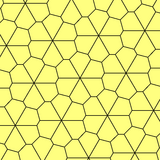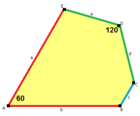Snub trihexagonal tiling
| Snub trihexagonal tiling | |
|---|---|
 | |
| Type | Semiregular tiling |
| Vertex configuration |  3.3.3.3.6 |
| Schläfli symbol | sr{6,3} or |
| Wythoff symbol | | 6 3 2 |
| Coxeter diagram | |
| Symmetry | p6, [6,3]+, (632) |
| Rotation symmetry | p6, [6,3]+, (632) |
| Bowers acronym | Snathat |
| Dual | Floret pentagonal tiling |
| Properties | Vertex-transitive chiral |
In geometry, the snub hexagonal tiling (or snub trihexagonal tiling) is a semiregular tiling of the Euclidean plane. There are four triangles and one hexagon on each vertex. It has Schläfli symbol of sr{3,6}. The snub tetrahexagonal tiling is a related hyperbolic tiling with Schläfli symbol sr{4,6}.
Conway calls it a snub hextille, constructed as a snub operation applied to a hexagonal tiling (hextille).
There are 3 regular and 8 semiregular tilings in the plane. This is the only one which does not have a reflection as a symmetry.
There is only one uniform coloring of a snub trihexagonal tiling. (Naming the colors by indices (3.3.3.3.6): 11213.)
Circle packing
The snub trihexagonal tiling can be used as a circle packing, placing equal diameter circles at the center of every point. Every circle is in contact with 5 other circles in the packing (kissing number).[1] The lattice domain (red rhombus) repeats 6 distinct circles. The hexagonal gaps can be filled by exactly one circle, leading to the densest packing from the triangular tiling#circle packing.
Related polyhedra and tilings

| Uniform hexagonal/triangular tilings | ||||||||
|---|---|---|---|---|---|---|---|---|
| Fundamental domains |
Symmetry: [6,3], (*632) | [6,3]+, (632) | ||||||
| {6,3} | t{6,3} | r{6,3} | t{3,6} | {3,6} | rr{6,3} | tr{6,3} | sr{6,3} | |

|

|

|

|

|

|

|

|

|
| Config. | 63 | 3.12.12 | (6.3)2 | 6.6.6 | 36 | 3.4.6.4 | 4.6.12 | 3.3.3.3.6 |
Symmetry mutations
This semiregular tiling is a member of a sequence of snubbed polyhedra and tilings with vertex figure (3.3.3.3.n) and Coxeter–Dynkin diagram ![]()
![]()
![]()
![]()
![]() . These figures and their duals have (n32) rotational symmetry, being in the Euclidean plane for n=6, and hyperbolic plane for any higher n. The series can be considered to begin with n=2, with one set of faces degenerated into digons.
. These figures and their duals have (n32) rotational symmetry, being in the Euclidean plane for n=6, and hyperbolic plane for any higher n. The series can be considered to begin with n=2, with one set of faces degenerated into digons.
| n32 symmetry mutations of snub tilings: 3.3.3.3.n | ||||||||
|---|---|---|---|---|---|---|---|---|
| Symmetry n32 |
Spherical | Euclidean | Compact hyperbolic | Paracomp. | ||||
| 232 | 332 | 432 | 532 | 632 | 732 | 832 | ∞32 | |
| Snub figures |

|

|

|

|

|

|

|

|
| Config. | 3.3.3.3.2 | 3.3.3.3.3 | 3.3.3.3.4 | 3.3.3.3.5 | 3.3.3.3.6 | 3.3.3.3.7 | 3.3.3.3.8 | 3.3.3.3.∞ |
| Gyro figures |

|

|

|

|

|

|

|

|
| Config. | V3.3.3.3.2 | V3.3.3.3.3 | V3.3.3.3.4 | V3.3.3.3.5 | V3.3.3.3.6 | V3.3.3.3.7 | V3.3.3.3.8 | V3.3.3.3.∞ |
Floret pentagonal tiling
| Snub trihexagonal tiling | |
|---|---|
 | |
| Type | Dual semiregular tiling |
| Faces | irregular pentagons |
| Coxeter diagram | |
| Symmetry group | p6, [6,3]+, (632) |
| Rotation group | p6, [6,3]+, (632) |
| Dual polyhedron | Snub trihexagonal tiling |
| Face configuration | V3.3.3.3.6 |
| Properties | face-transitive, chiral |
In geometry, the floret pentagonal tiling or rosette pentagonal tiling is a dual semiregular tiling of the Euclidean plane. It is one of 15 known isohedral pentagon tilings. It is given its name because its six pentagonal tiles radiate out from a central point, like petals on a flower.[2] Conway calls it a 6-fold pentille.[3] Each of its pentagonal faces has four 120° and one 60° angle.
It is the dual of the uniform tiling, snub trihexagonal tiling,[4] and has rotational symmetry of orders 6-3-2 symmetry.
Variations
The floret pentagonal tiling has geometric variations with unequal edge lengths and rotational symmetry, which is given as monohedral pentagonal tiling type 5. In one limit, an edge-length goes to zero and it becomes a deltoidal trihexagonal tiling.
 (See animation) |
 a=b, d=e A=60°, D=120° |
 Deltoidal trihexagonal tiling |
 a=b, d=e, c=0 60°, 90°, 90°, 120° |
Related tilings
| Symmetry: [6,3], (*632) | [6,3]+, (632) | |||||
|---|---|---|---|---|---|---|

|

|

|

|

|

|

|
| V63 | V3.122 | V(3.6)2 | V36 | V3.4.6.4 | V.4.6.12 | V34.6 |
See also
References
- ^ Order in Space: A design source book, Keith Critchlow, p.74-75, pattern E
- ^ Five space-filling polyhedra by Guy Inchbald
- ^ John H. Conway, Heidi Burgiel, Chaim Goodman-Strass, The Symmetries of Things 2008, ISBN 978-1-56881-220-5 [1] (Chapter 21, Naming Archimedean and Catalan polyhedra and tilings, p288 table)
- ^ Weisstein, Eric W. "Dual tessellation". MathWorld.
- John H. Conway, Heidi Burgiel, Chaim Goodman-Strass, The Symmetries of Things 2008, ISBN 978-1-56881-220-5 [2]
- Grünbaum, Branko ; and Shephard, G. C. (1987). Tilings and Patterns. New York: W. H. Freeman. ISBN 0-7167-1193-1.
{{cite book}}: CS1 maint: multiple names: authors list (link) (Chapter 2.1: Regular and uniform tilings, p. 58-65) - Williams, Robert (1979). The Geometrical Foundation of Natural Structure: A Source Book of Design. Dover Publications, Inc. ISBN 0-486-23729-X. p. 39
- Keith Critchlow, Order in Space: A design source book, 1970, p. 69-61, Pattern R, Dual p. 77-76, pattern 5
- Dale Seymour and Jill Britton, Introduction to Tessellations, 1989, ISBN 978-0866514613, pp. 50–56, dual rosette tiling p. 96, p. 114






